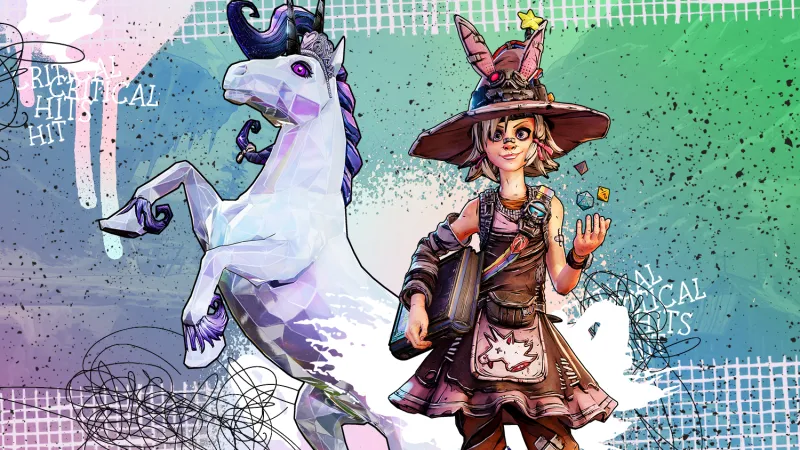
Platform: PlayStation 5, PlayStation 4, Xbox One, PC
Publisher: 2K Games
Developer: Gearbox Software
Release:
Rating: Teen
The Borderlands franchise has given players four mainline campaigns, a ton of downloadable content, multiple spin-off games, and even an upcoming feature film starring A-list Hollywood talent. But perhaps paramount to those accomplishments are the series’ characters. Along the way, players have met the likes of Claptrap, Lilith, and Handsome Jack, who have captivated players, leading them to wonder what could possibly happen next in the wild world of Borderlands.
However, few characters are as memorable as Tiny Tina, the 13-year-old explosives expert introduced in the second game. Now, as the Borderlands franchise itself prepares to turn 13 years old later this year, Gearbox hands the reins of its ambitious new spin-off to the character that captured so many hearts (and likely stopped just as many from beating). We went hands-on with Tiny Tina’s Wonderlands for hours and spoke with the team to learn why this unique direction for the franchise is such an exciting venture both for Gearbox and the series’ devoted fan base.
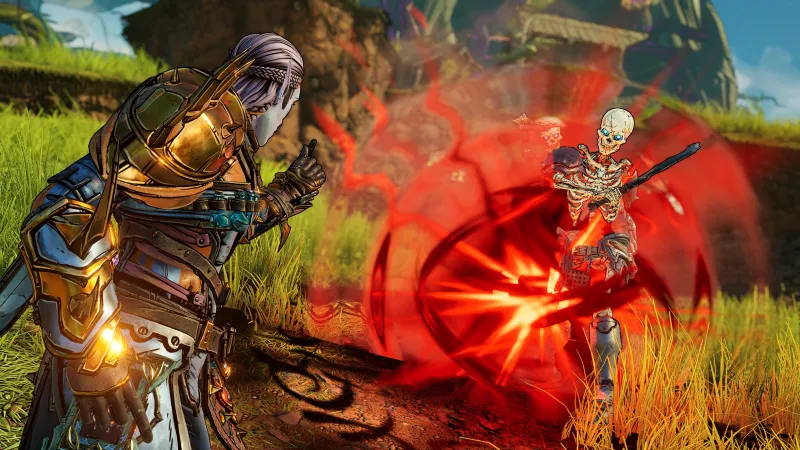
Tiny Tina, Big Ideas
Tiny Tina, voiced by Ashly Burch, proved to be an immediate hit with fans. She soon received her own downloadable content campaign for Borderlands 2, Tiny Tina’s Assault on Dragon Keep. That DLC placed players in a game of “Bunkers & Badasses,” an homage to Dungeons & Dragons, with Tiny Tina serving as the unpredictable “Bunker Master.” Thanks to Tina’s hilarious and unreliable narration, the high-fantasy themes, and comical references to fantasy games and movies, Assault on Dragon Keep is widely considered one of the best pieces of DLC in the series’ history.
The team at Gearbox noticed that, in addition to latching onto Tiny Tina as a character, the player base also enjoyed Assault on Dragon Keep’s tabletop trappings and the duality of a game within a game. The team felt it had only scratched the surface of exploring what it could do in a fantasy setting with looter-shooter mechanics.
“It became pretty obvious to us very, very early that it could be so much more than just an add-on to another game,” creative director Matt Cox says. “With the fantasy looter-shooter and the character of Tiny Tina, the ceiling was way higher and just really deserved its own standalone treatment.”
Gearbox wants this new effort to deliver all the unique experiences of the Tiny Tina’s Assault on Dragon Keep DLC, but with a lower barrier-to-entry. Since this is a standalone story, players can enter Wonderlands with no knowledge of Borderlands’ lore or backstory. However, existing fans could notice various nods to established characters in the Borderlands world.
Despite being a standalone adventure, Tiny Tina’s Wonderlands retains many of the conventions and mechanics players have grown familiar with, while expanding on them in several fun ways. Wonderlands takes place in a D&D-like realm, but guns are still front and center. New gun types lean into the fantasy elements, with magic barrels you reload by sprinkling fairy dust and crossbow bolts that multiply their damage based on how many bolts you stick in an enemy.
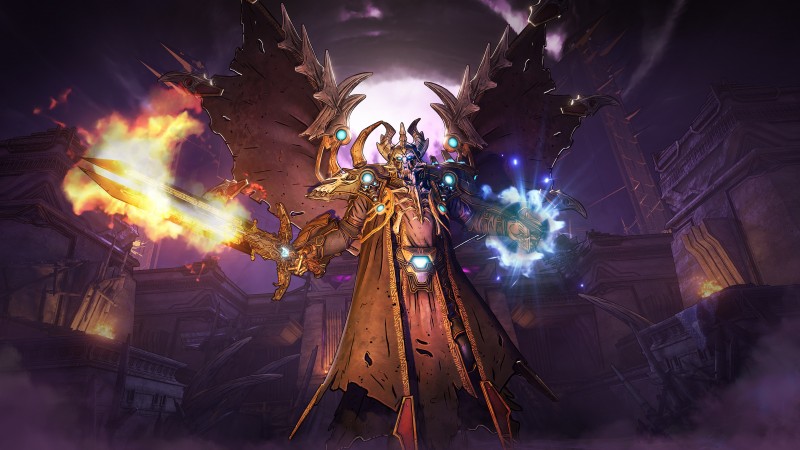
However, combat encounters are more diverse affairs, as spells play a prominent role. Spells change the way you approach encounters significantly and work in conjunction with the fun gunplay and wild weaponry Borderlands fans are already familiar with. Now, in addition to blasting enemies away with the latest and greatest loot you picked up, you can open fissures in the ground, summon pets to fight alongside you, and even cast protection enchantments for you and your allies. These spells act like the main series’ grenades in that you have a dedicated equipment slot and button for them, but they operate on a cooldown and have a wide array of effects.
“We knew we wanted to update that looter-shooter loop to something that’s a little bit more unique to the idea of this fantasy world, and we thought these spells were an absolutely great way to move that forward,” senior producer Kayla Belmore says. “We really want them to feel powerful and like an action skill. This allowed the guns to still really shine and be the stars of the show, but have an alternate part of the combat that felt really special and unique. And you know, who doesn’t love summoning giant meteors from the sky and squishing your enemies?”
Melee also receives an upgrade in Wonderlands’ combat system. No longer meant as a last resort if an enemy gets too close, melee weapons now get their own specialized gear slot. Melee weapons can be picked up as loot, and they have different attributes that allow you to synergize and tailor your combat style to the way you want to play. I had the chance to see all these grand ambitions come together in a cohesive way when I fired up a pre-release build of Tiny Tina’s Wonderlands.
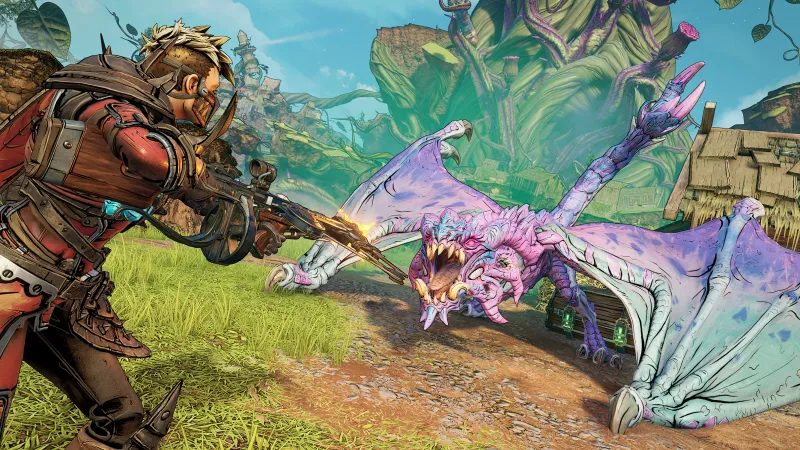
Getting Creative
The differences in gameplay in Tiny Tina’s Wonderlands go much deeper than spells and upgraded melee weapons. The gameplay structure combines the team’s inspiration from RPGs and the tried-and-true Borderlands formula.
Right out of the gate, players will notice that they now create their own characters rather than the Borderlands convention of giving you four established characters from which to choose. While I didn’t get the opportunity to create my own, the two characters I played looked and sounded very different from one another.
In this new creator, players can choose different personalities before selecting from two voiceprints and adjusting the pitch via a slider. Because the six character classes are separate from looks, Gearbox is excited to give players the opportunity to not have the character’s identity be tied so tightly to their play style. This notion was carried over from inspirations like Dungeons & Dragons, other fantasy games, and even JRPGs. But at its core, this shift from the main series was the team wanting to empower the player to play who they want.
“Allowing the player to express themselves was something very important to a lot of people on the team,” Belmore says. “We really want players to be able to represent themselves, their fantasy self, or something completely outlandish if they feel like it. It’s all up to them and what they want to see and what they want to do. That’s really special for us.”
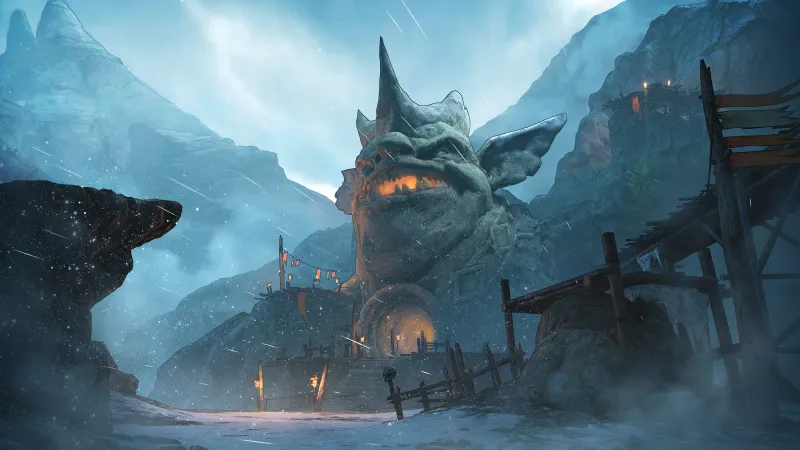
As you level up, each character has skill trees and hero stats to upgrade. Skill trees play out much like standard Borderlands progression. Meanwhile, hero stats allow you to upgrade typical RPG stats: strength (critical hit damage), dexterity (critical hit chance), intelligence (spell cooldown), and more. In my playthrough, I was landing a ton of headshots, so I poured a lot of my hero points into strength to boost the damage.
My gameplay session takes place on Mount Craw, a snowy mountain full of caves, cliffs, and critters. If you’re hoping for some goblins and trolls to fight amid this game’s fantasy setting, my time in Mount Craw offers plenty. I can choose between two classes in this build, but there will be a total of six in the final version. While the Graveborn build gives me some great dark magic and a Demi-Lich companion, I love the Stabbomancer class, which allows me to summon magical whirling blades that deal persistent damage to enemies in the area.
Regardless of how important spells and melee are to the overall equation, I immediately see what the team means when it says that guns are still the star of the show. Blasting through goblins (who all have their own weird weapons and powers) is so much fun, thanks to the interesting arsenal I pick up along the way. From an automatic scoped rifle that fires arrows to an SMG that launches area-of-effect bombs and restores some of your health with each successful shot, the Borderlands pedigree is alive and well, even in a fantasy setting.

Tales from the Wonderlands
Borderlands games have always allowed players to see their co-op partners’ characters, but with more customization options available to players, Gearbox gives you more opportunities to marvel at your creation. One such opportunity comes through an overworld, which lets you walk about in third-person view, an idea Cox says was taken from old-school JRPGs and classics like Zelda II: The Adventure of Link.
That’s not the only difference carried over by way of the JRPG genre, as players can enter the tall grass in the overworld and engage in random encounters that reward you with loot and experience. When a random encounter occurs, you are pushed back into first-person view, and you battle the enemies just as you would in a standard mission.
This overworld encourages exploration to allow you to fully experience the world of Tiny Tina’s Wonderlands. In addition to overworld-specific quests, you can even discover completely new maps to explore and complete missions. For instance, the Mount Craw map I play is not a part of the main plotline. Instead, you discover that through the overworld. Once you’re in Mount Craw, you have a self-contained storyline connected to the environment and its inhabitants. Mount Craw is just one example of these side maps that offer major quests for players that supplement the overall story and lore of the Wonderlands but are standalone in nature.
Click here to watch embedded media
As you find these extra maps, you’ll notice more sidequests available in the hub world. For example, as you discover Mount Craw, you may start seeing “wanted” posters around the tavern for characters in that area. You can start quests by exploring in the Wonderlands, talking to NPCs, or by simply picking up notes at the tavern, making it so players have many opportunities to find this side content, then engage with it if they want.
In my time exploring Mount Craw, I meet Jar, a small goblin fighting to free her enslaved race. To help her, I need to free prisoners, secure bombs, blow up a gate, and defeat a frost skeleton. Then I have to plunge his heart into a forge to freeze it, defeat powerful magic-wielding oracles, and finally take down a mechanical dragon in a tense boss fight. While that’s the main questline in this standalone map, I can also take on sidequests, like helping Claptrap (made of wood) collect ore to use in his forge. Assisting Jar and freeing her fellow goblins is certainly the highlight, but this early build gives me hope for the sheer breadth of quest-driven content in the final game.
With so much available to players at any given time, Gearbox has implemented a new system to ensure players cannot out-level quests. In Tiny Tina’s Wonderlands, if you return to a quest you picked up in the game’s early stages, the challenge levels with you. This provides commensurate rewards, making it both engaging and worthwhile to the player regardless of how much stronger they became in the time since accepting the quest.
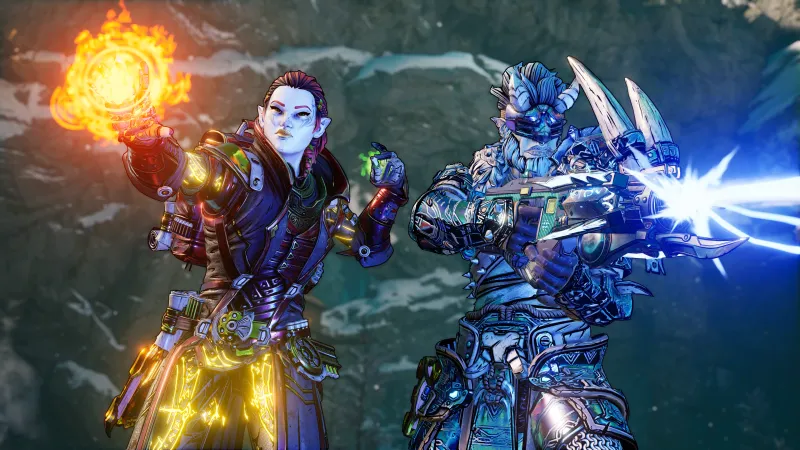
Rolling the Dice
After Borderlands 3 gave players another Vault-hunting adventure in 2019, a game that shakes up the formula could be a perfect opportunity to energize the fan base. Tiny Tina has clearly demonstrated her staying power within both the franchise and the community at large, so thrusting her into the spotlight in perhaps the most chaotic and over-the-top game Gearbox has ever developed sounds like a match made in heaven.
I had a blast exploring Mount Craw and experimenting with the various guns, spells, and melee weapons. I can’t wait to see what else Tiny Tina’s Wonderlands has in store for me when the game launches later this month.
This article originally appeared in issue 344 of Game Informer.
Hope to see you in Next Article Soon!

No comments:
Post a Comment